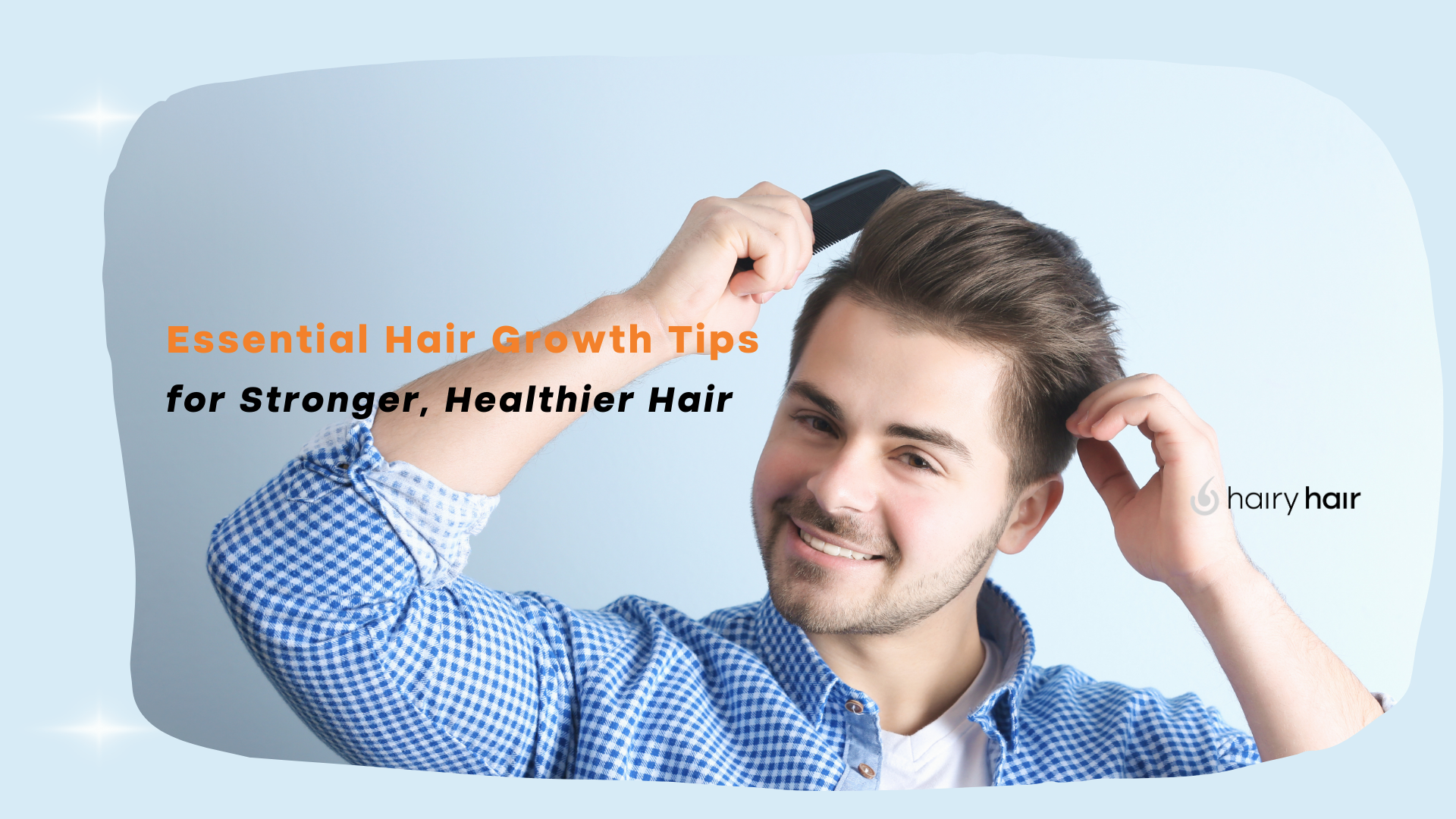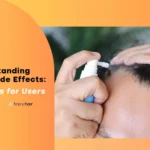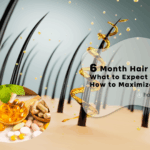Essential Hair Growth Tips for Stronger, Healthier Hair

Achieving healthy hair is not just about using the right hair products alone. It involves a healthy diet, lifestyle, and having healthy hair habits.
Since we’re born with all the hair follicles we will ever have (around 100,000), some of them will stop producing hair as we age, leading to hair loss.
Your hair is not just about your appearance, it can reflect your overall health.
At Hairy Hair, we understand the importance of having thick, lush hair so we want to share with you some tips to help your hair grow stronger and healthier.
- Understanding hair growth
- How does nutrition and diet impact hair growth?
- What hair care tips can help with growth?
- How can I treat my scalp for healthy hair growth?
- How can I style my hair for healthy growth?
- Additional tips for hair growth
- Final thoughts
Understanding hair growth
First, it’s important to understand how hair grows to know how to help improve it.
What is hair growth?
Hair growth is a natural process that occurs in three stages:
- Anagen (active growth)
- Catagen (transition phase)
- Telogen (resting phase)
Hair grows around half an inch a month, but this can vary from person to person. Hormones, genetics, and overall health influence hair growth.
[elementor-template id=”9678″]
Typically people with longer hair have a longer anagen phase. It can also depend on how the cells at your hair follicle base react in multiplying to become hair cells.
Of course, the best way to improve hair growth would be to extend the anagen phase.
However, researchers are still looking into how the body activates the anagen phase of hair growth. Therefore, many tips for hair growth are more focused on changes you can make to your lifestyle to improve the health of your hair.
You should see a board-certified dermatologist about hair growth if you notice abrupt hair loss without an identifiable trigger.
How does nutrition and diet impact hair growth?
To promote hair growth you need to ensure you have a balanced diet that has enough protein and is full of essential nutrients. Deficiencies in several key nutrients such as iron, zinc, selenium, or vitamin D can lead to hair loss. One of the most important nutrients for hair growth however is a protein called keratin.
Why is protein important for your hair?
- Hair is made up of dead skin cells and a protein called keratin, making protein essential for healthy hair growth.
- Include protein-rich foods like eggs, lean meats, fish, and plant-based sources like legumes and nuts in your diet to promote hair growth.
- A protein deficiency can lead to hair loss and thinning so ensure you’re getting enough protein.
Which vitamins and nutrients are needed for healthy hair?
- A diet rich in vitamins and nutrients is essential for hair growth.
- Low iron causes anaemia, which can trigger hair loss.
- Vitamins and minerals like zinc, omega-3 fatty acids, biotin, vitamins B, D, E, and iron play a crucial role in promoting healthy hair growth.
- Consult with a healthcare professional before starting any supplementation regimen.
What hair care tips can help with growth?
Once your diet and nutrition are covered, you might want to take a look at how you treat your hair. It’s not just about using the right hair products, it’s often about how you are using those products and what tools you are using to maintain your hair.
Rethink the way you wash your hair
- Use a gentle, sulphate-free shampoo and conditioner suitable for your hair type.
- Avoid over-washing your hair, as this can strip it of its natural oils.
- Use warm water instead of hot water to wash your hair gently to prevent damage.
Why should I be careful about using conditioner?
- Once a week, use a deep conditioning treatment to nourish and moisturize your hair gently.
- Don’t overuse conditioner as it can cause your hair to become greasy.
- Pay attention to the ends of your hair to prevent clogging the pores on your scalp.
How can I protect my hair from damage?
- To prevent damage, use a heat protectant when using heat styling tools, especially if you have fine hair.
- Avoid using harsh chemicals or dyes on your hair regularly, as these can cause it to weaken and lead to breakage.
- Use a hair mask once a week to repair and restore your damaged hair.
How can I treat my scalp for healthy hair growth?
As your hair grows from the scalp, ensuring that your scalp is healthy is often key to helping promote hair growth. If your scalp is lacking in natural oils or is overwashed, it can cause issues with hair growth.
If you experience significant hair loss, slower hair growth, bald patches, or persistent scalp issues, it’s time to consult a hair doctor. Your doctor can recommend prescription treatments that have research backing their effectiveness.
Managing your scalp health
- A healthy scalp is essential for hair growth.
- A regular scalp massage may help increase blood circulation to hair follicles.
- Use a scalp serum or oil to nourish and moisturize your scalp.
- Topical caffeine may help stimulate hair growth.
[elementor-template id=”9673″]
How can I style my hair for healthy growth?
How you style and treat your hair can often affect the way it grows. If your hair type is oily, the products you use may be different compared to dry hair but there are general tips for how you should treat your hair.
Avoid damaging treatments on wet hair
- Try not to excessively brush your hair as it can cause breakages in the follicles and damage the hair.
- Wet hair is vulnerable to breaking and damage so wait until it is almost dry to brush it.
- Avoid tight hairstyles using heat styling tools which can cause hair loss and breakage.
Use gentle hair styling techniques
- Use a wide-tooth comb or a detangling brush to gently comb out tangles.
- Avoid using hair ties or clips that can cause hair breakage.
- Use a microfiber towel or an old t-shirt to gently blot out excess water when your hair is wet.
Additional tips for hair growth
Reduce stress for hair growth
- High stress levels can lead to hair loss and slow down hair growth.
- Practice stress-reducing techniques like meditation, yoga, or deep breathing exercises.
- Get enough sleep and maintain a healthy lifestyle to reduce stress.
Get regular trims
- To promote healthier and longer hair, regular trims can help prevent split ends and breakage.
- Get a trim every 6-8 weeks to maintain healthy hair.
Use a hair mask for healthy hair follicles
- Use a hair mask once a week to repair and restore your hair.
- Leave the mask on for at least 30 minutes before rinsing.
- Use a hair mask that contains ingredients like keratin, argan oil, or coconut oil.
Protect your hair from the elements
- Use a hat or a scarf to protect your hair from the sun, wind, and cold weather.
- Use a hair serum or oil to protect your hair from damage caused by the elements.
- Avoid going out in extreme weather conditions without protecting your hair.
Take a daily hair growth supplement
If you find that you’re experiencing hair loss, one of the best remedies is to treat it with a hair growth supplement. At Hairy Hair, our subscription service provides you with one convenient pill to take daily to help fight hair loss.
Minoxidil is an over-the-counter medication that can help regrow lost hair.
With 98% of customers satisfied with our service, you can enjoy thick, healthy hair in as little as 6 months from the beginning of your, treatment.
Best of all, you can enjoy this service from the comfort of your home with a reliable customer support team and deliveries straight to your door without the need for a visit to the clinic.
Final thoughts
Achieving the right balance of a healthy diet, lifestyle and hair treatments can be difficult. And sometimes even with all the right elements it may not be enough to prevent hair loss due to genetics.
Thankfully at Hair Hair, we’re on hand to provide a tailored service to help you achieve beautiful and strong hair.
Contact us today to start your journey to regain your hair. Our team of experts are on hand to help your damaged hair grow back stronger and fight against your hair loss.
In This Article
Overview
Most Trending Articles


